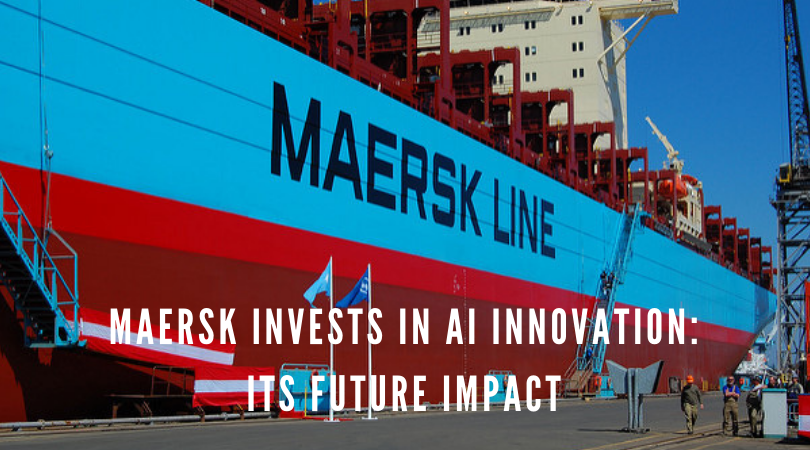Maersk Invests in AI Innovation: Its Future Impact
Artificial Intelligence is the new kid on the block in the world of technology and it is no wonder that it is gradually taking control over many of the industries. Artificial Intelligence (AI) can is considered to be highly efficient in assembling and analyzing logistics data, which will eventually make it easier to make well-planned decisions in business. This virtue is gaining the attention of carriers, shippers, freight forwarders etc. all over the world and major shipping lines have decided to invest in this innovative technology.
The use of AI can be extended to a wide range of digital capabilities, which not only includes the creation of robots and driverless vehicle, but also the extraction of data from an image or the design of a computer vision. The movement of cargo can be executed in a much more organized manner as Artificial Intelligence can aid in optimizing the cost, resources and transit time required for smoothly transferring the cargo from one place to another.
With the addition of Artificial Intelligence advancements, the container shipping sector is now equipped with all the necessary information to make accurate decisions in gathering and evaluating logistics data. As a matter of fact, this science-fiction trope called AI has a lot of hidden potential to become the next big digital game changer in the technological universe. Indeed, the marine industry has a lot to gain from this innovation and can expect a marked improvement in the containerized supply chains in the near future. The supply chains can ensure that the clients get better services in the form of equipment availability and just-in-time transits.
Keeping in tune with the flow, many shipping giants (like Maersk, Flexport and Panalpina) are looking forward to investing in and later harnessing the power of Artificial Intelligence to resolve many problematic issues that are currently prevalent in the maritime sector. Like every other tech-based invention, the AI requires the learning of a few fundamental techniques like the correct utilization of computer systems to simulate the human intelligence.
With the proper usage and the involvement of IT companies (like Maana, ClearMetal), the shipping companies can sort out the day-to-day issues like successfully predicting a vessel’s arrival time, preparing the logistical resources beforehand, settling on the substitute if and when the original one is blocked, etc. and so on. Moreover, Artificial Intelligence is now capable of even informing earlier if a shipper is about to cancel its appointment or a container might be abandoned on the dock. Seriously, there is no way we can undermine the significance of AI and the way in which it can even outsmart the human mind!
With no intention of lagging behind, once again Maersk has become a trend-setter by striking up a deal with Loadsmart, a freight-booking Artificial Intelligence start-up company from New York. Intending to diversify its maritime transportation and other operations, Maersk has decided to provide Loadsmart with a $21.6 million Series A funding. The investment was made through the Maersk Growth department, which it solely dedicated to the research and application of newly launched technologies. Two other companies like Chromo Invest (an assessment management firm) and Connor Capital SB (investment firm) have joined Maersk in supporting the freight-booking start-up.
Currently, the utility of Artificial Intelligence in solving problems and fulfilling tasks is still in the nascent phase as the shipping industry is somewhat reluctant in introducing or adapting to any new technology. As a solution, the industry officials are planning to carefully integrate the AI techniques instead of the traditional ones to maximize the effect.
After receiving the new investment from the world’s largest container shipping line, Loadsmart will be able to utilize it to boost the necessary engineering and product operations. The start-up has also leveraged AI to make the truckload booking flow in the United States, to be transformed into an automated operation. Plus, it has also offered instant costs to shippers with guaranteed capacity concerning all the country’s lanes.
By logging on to this automated platform, it will become unbelievably easy for the shippers to pick and book a truck in a matter of seconds, and even decrease the procurement execution by 90% and spot exposure by 50%. Sune Stilling, the Head of Maersk Growth, believes that this joint agreement has a huge potential of reaching great heights in the long run. The target is to enable forward integrations between ocean shipping and over-the-road services to build brilliant synergies and provide the clients with an improved service.
Sharing his views on this matter, Richard Salgado (the Co-founder and CEO of Loadsmart), has mentioned that the main strategy is to lay more stress on technology and product development. He also agreed to the fact that the generous investment from Maersk will play a significant role in enhancing the overall growth of the company. In order to increase the business exponentially while simultaneously keeping up the high-service levels, the investment will take care of everything related to technology and innovation and that will lead to a full-fledged progress without any fail. PTI has directly enquired about the details of the investment but Maersk has not yet disclosed any information to the media.
The implementation of Artificial Intelligence will definitely come in handy in banishing the unpredictability and improving visibility in the vast reservoir of information of the supply chains in logistics and shipping. According to the views put forward by the CEO of Flexport, Ryan Peterson, the introduction of AI can simplify the complexities in a supply chain since there are many interdependencies between variables. With such a simple addition, the shippers will be free to control how their shipment is moved to lower working capital needs or transit times. AI employs the concept of “machine learning” where the algorithms are programmed to analyze data and offer the correct analysis, based on the knowledge derived from the results.
Drawing reference to a mathematical model developed by ManWo Ng, the Assistant Professor of Maritime and Supply Chain Management at the Old Dominion University, the machine learning is very effective at projecting a port terminal’s future chassis requirements. This particular model is concerned with critically analyzing certain factors such as the number of gate transactions been recorded, the number of berthed vessels been listed, the number of empty containers been received, or perhaps, the number of import containers been discharged.
ManWo Ng is confident that the continuous refinement related to the machine learning procedure, will positively ensure that the generated algorithm can predict the future chassis demand with much more sincerity than the conventional methods. Therefore, we can safely conclude that the utilization of machine learning can lead to the repositioning of prices along with a more positive influence on the environment. This can be achieved by the removal of unnecessary chassis repositioning trips. Presently, in the shipping arena, the Artificial Intelligence technology is being concentrated on the large-scale number crunching that can derive information from various sources and then, change it to use as the foundation for a reliable, decision-making procedure. The factor of human input is slowly losing its importance day by day as AI has made it possible to reduce human interference for a far better outcome, hopefully.


















